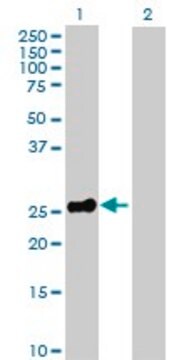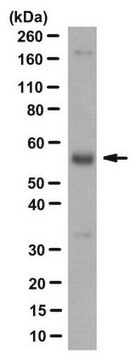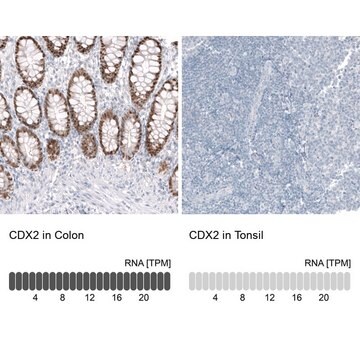MAB1072
Anti-Erythropoietin Antibody, clone 1C8
clone 1C8, Chemicon®, from mouse
Synonym(s):
erythropoietin, Epoetin, epoetin
Sign Into View Organizational & Contract Pricing
All Photos(4)
About This Item
UNSPSC Code:
12352203
eCl@ss:
32160702
NACRES:
NA.41
Recommended Products
biological source
mouse
Quality Level
antibody form
purified antibody
clone
1C8, monoclonal
species reactivity
human
manufacturer/tradename
Chemicon®
technique(s)
ELISA: suitable
immunofluorescence: suitable
western blot: suitable
isotype
IgG2b
NCBI accession no.
UniProt accession no.
shipped in
wet ice
target post-translational modification
unmodified
General description
Erythropoietin (Epo) is a glycoprotein consisting of one 165-amino acid single-chain polypeptide with two internal disulfide bonds. When fully glycosylated, the molecular weight of Epo is approximately 34 kDa. Normally produced by the liver and kidney, Epo is the principle regulator of red blood cell production by stimulating the division and differentiation of bone marrow erythroid progenitor cells in response to anemia and hypoxia.
Specificity
Reacts with human Erythropoietin (Epo).
Immunogen
Recombinant human Epo.
Application
Detect Erythropoietin using this Anti-Erythropoietin Antibody, clone 1C8 validated for use in ELISA, IF & WB.
ELISA:
For the determination of Epo concentration in the range of 2-200 ng/mL. Use at 5 ug/mL to coat plate.
Immunosorbent preparation
Optimal working dilutions must be determined by the end user.
For the determination of Epo concentration in the range of 2-200 ng/mL. Use at 5 ug/mL to coat plate.
Immunosorbent preparation
Optimal working dilutions must be determined by the end user.
Research Category
Metabolism
Metabolism
Research Sub Category
Metabolic Hormones & Receptors
Metabolic Hormones & Receptors
Quality
Evaluated by Western Blot on Mouse kidney lysates.
Western Blot Analysis:
1:1000 dilution of this antibody detected glycosylated EPO on 10 µg of Mouse kidney lysates.
Western Blot Analysis:
1:1000 dilution of this antibody detected glycosylated EPO on 10 µg of Mouse kidney lysates.
Target description
34 kDa (glycosylated)
Physical form
Format: Purified
Protein A purified
Purified mouse monoclonal IgG2b in buffer containing 0.1M Tris-Glycine, 0.15M NaCl, 0.05% Sodium Azide, pH 7.4.
Storage and Stability
Stable for 1 year at 2-8ºC from date of receipt.
Analysis Note
Control
Produced by kidney or liver of adult mammals and by liver of fetal or neonatal mammals.
Produced by kidney or liver of adult mammals and by liver of fetal or neonatal mammals.
Other Notes
Concentration: Please refer to the Certificate of Analysis for the lot-specific concentration.
Legal Information
CHEMICON is a registered trademark of Merck KGaA, Darmstadt, Germany
Disclaimer
Unless otherwise stated in our catalog or other company documentation accompanying the product(s), our products are intended for research use only and are not to be used for any other purpose, which includes but is not limited to, unauthorized commercial uses, in vitro diagnostic uses, ex vivo or in vivo therapeutic uses or any type of consumption or application to humans or animals.
recommended
Product No.
Description
Pricing
Storage Class Code
12 - Non Combustible Liquids
WGK
WGK 1
Flash Point(F)
Not applicable
Flash Point(C)
Not applicable
Certificates of Analysis (COA)
Search for Certificates of Analysis (COA) by entering the products Lot/Batch Number. Lot and Batch Numbers can be found on a product’s label following the words ‘Lot’ or ‘Batch’.
Already Own This Product?
Find documentation for the products that you have recently purchased in the Document Library.
Thomas H Sanderson et al.
PloS one, 8(11), e78627-e78627 (2013-11-14)
Recent advancements in isolation techniques for cytochrome c (Cytc) have allowed us to discover post-translational modifications of this protein. We previously identified two distinct tyrosine phosphorylated residues on Cytc in mammalian liver and heart that alter its electron transfer kinetics
Our team of scientists has experience in all areas of research including Life Science, Material Science, Chemical Synthesis, Chromatography, Analytical and many others.
Contact Technical Service








